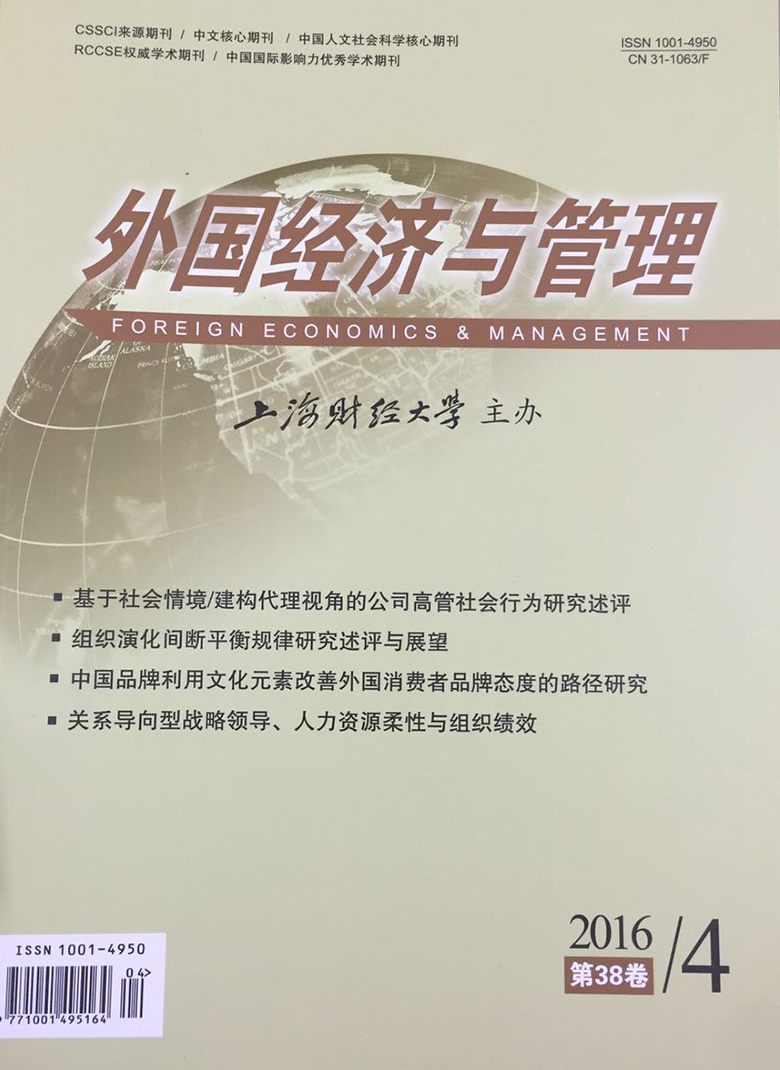中国转型经济下有关民营企业关系导向型战略领导与组织绩效关系的研究正处于起步阶段。本研究以动态能力理论为基础,探讨了关系导向型战略领导对组织绩效的影响机制,尤其是研究了人力资源柔性在两者间的中介作用和环境不确定性的调节作用。本研究对中国14个城市460家民营企业的950名高管进行了问卷调查,最终收集了303家企业的有效配对样本数据,并运用SPSS和LISREL软件进行了实证分析。研究发现:关系导向型战略领导对组织绩效有正向影响作用,人力资源柔性在两者之间起部分中介作用;环境不确定性在关系导向型战略领导与人力资源柔性的关系中起正向调节作用,而在人力资源柔性与组织绩效的关系中不起调节作用。研究表明,考虑人力资源柔性和环境不确定性两个重要因素,可以更好地解释民营企业关系导向型战略领导对组织绩效的影响机制,能够为转型经济下民营企业实施关系导向型战略领导和提升人力资源柔性提供重要参考。
关系导向型战略领导、人力资源柔性与组织绩效——基于转型经济下民营企业的实证研究
摘要
参考文献
1 Agyapong A, Boamah R B. Business strategies and competitive advantage of family hotel businesses in Ghana: The role of strategic leadership. Journal of Applied Business Research (JABR), 2013, 29(2): 531–544
2 Baron R M, Kenny D A. The moderator-mediator variable distinction in social psychological research: Conceptual, strategic, and statistical considerations. Journal of Personality and Social Psychology, 1986, 51(6): 1173–1182
3 Becker B E, Huselid M A. Strategic human resources management: Where do we go from here?. Journal of Management, 2006, 32(6): 898–925
4 Beltrán-Martíin I, Roca-Puig V, Escrig-Tena A, et al. Human resource flexibility as a mediating variable between high performance work systems and performance. Journal of Management, 2008, 34(5): 1009–1044
5 Bhattacharya M, Gibson D E, Doty D H. The effects of flexibility in employee skills, employee behaviors, and human resource practices on firm performance. Journal of Management, 2005, 31(4): 622–640
6 Carmeli A, Tishler A, Edmondson A C. CEO relational leadership and strategic decision quality in top management teams: The role of team trust and learning from failure. Strategic Organization, 2012, 10(1): 31–54
7 Chen J Y, Reilly R R, Lynn G S. The impacts of speed-to-market on new product success: The moderating effects of uncertainty. IEEE Transactions on Engineering Management, 2005, 52(2): 199–212
8 Combe I A, Rudd J M, Leeflang P S H, et al. Antecedents to strategic flexibility: Management cognition, firm resources and strategic options. European Journal of Marketing, 2012, 46(10): 1320–1339
9 Cunliffe A L, Eriksen M. Relational leadership. Human Relations, 2011, 64(11): 1425–1449
10 Dimitrios N K, Sakas D P, Vlachos D S. The role of information systems in creating strategic leadership model. Procedia-Social and Behavioral Sciences, 2013, 73: 285–293
11 Fini R, Grimaldi R, Marzocchi G L, et al. The determinants of corporate entrepreneurial intention within small and newly established firms. Entrepreneurship Theory and Practice, 2012, 36(2): 387–414
12 HouseR JDorfmanP WJavidanMStrategic leadership across cultures: GLOBE study of CEO leadership behavior and effectiveness in 24 countriesNew Delhi: SAGE Publications2013
13 Ireland R D, Hitt M A. Achieving and maintaining strategic competitiveness in the 21st century: The role of strategic leadership. The Academy of Management Executive, 1999, 13(1): 43–57
14 Ketkar S, Sett P K. Environmental dynamism, human resource flexibility, and firm performance: Analysis of a multi-level causal model. The International Journal of Human Resource Management, 2010, 21(8): 1173–1206
15 Kinuu D, Murgor P, Ongeti W, et al. Upper echelons theory and research: A review of theory and empirical literature 28 years later. Prime Journal of Business Administration and Management (BAM), 2012, 2(10): 697–703
16 Liu W P, Yang H B, Zhang G X. Does family business excel in firm performance? An institution-based view. Asia Pacific Journal of Management, 2012, 29(4): 965–987
17 Martínez-Sánchez A, Vela-Jiménez M J, Pérez-Pérez M, et al. The dynamics of labour flexibility: Relationships between employment type and innovativeness. Journal of Management Studies, 2011, 48(4): 715–736
18 Miller D. The structural and environmental correlates of business strategy. Strategic Management Journal, 1987, 8(1): 55–76
19 Netemeyer R G, Johnston M W, Burton S. Analysis of role conflict and role ambiguity in a structural equations framework. Journal of Applied Psychology, 1990, 75(2): 148–157
20 Ngo H Y, Loi R, Foley S. Human resource flexibility in foreign subsidiaries: An empirical investigation in Hong Kong. International Journal of Business Studies, 2012, 20(1): 11–26
21 Oke A, Walumbwa F O, Myers A. Innovation strategy, human resource policy, and firms' revenue growth: The roles of environmental uncertainty and innovation performance. Decision Sciences, 2012, 43(2): 273–302
22 Parnell J A, Lester D L, Long Z, et al. How environmental uncertainty affects the link between business strategy and performance in SMEs: Evidence from China, Turkey, and the USA. Management Decision, 2012, 50(4): 546–568
23 Peng M W, Luo Y D. Managerial ties and firm performance in a transition economy: The nature of a micro-macro link. Academy of Management Journal, 2000, 43(3): 486–501
24 Peng M W. Institutional transitions and strategic choices. Academy of Management Review, 2003, 28(2): 275–296
25 Rowe W G. Creating Wealth in organizations: The role of strategic leadership. The Academy of Management Executive, 2001, 15(1): 81–94
26 Stadler C, Helfat C E, Verona G. The impact of dynamic capabilities on resource access and development. Organization Science, 2013, 24(6): 1782–1804
27 Strand R. Strategic leadership of corporate sustainability. Journal of Business Ethics, 2014, 123(4): 687–706
28 Teece D J. Dynamic capabilities: Routines versus entrepreneurial action. Journal of Management Studies, 2012, 49(8): 1395–1401
29 Tracey J B. A contextual, flexibility-based model of the HR-firm performance relationship. Management Decision, 2012, 50(5): 909–924
30 Veise S, Gholami A, Hassanaki L, et al. The effects of human resource flexibility on human resources development. Management Science Letters, 2014, 4(8): 1789–1796
31 Wang D X, Tsui A S, Zhang Y C, et al. Employment relationships and firm performance: Evidence from an emerging economy. Journal of Organizational Behavior, 2003, 24(5): 511–535
32 Way S A, Wright P M, Tracey J B. HR flexibility and firm performance: The cross-level moderating effect of industry dynamism. Academy of Management Proceedings, 2013
33 侯杰泰温忠麟成子娟结构方程模型及其应用北京: 教育科学出版社2004
34 林 亚清, 赵 曙明. 构建高层管理团队社会网络的人力资源实践、战略柔性与企业绩效——环境不确定性的调节作用. 南开管理评论, 2013 (2): 4–15
35 刘向东战略领导特征及其对企业战略选择和绩效影响机制研究天津: 南开大学2011
36 王 辉, 忻 蓉, 徐 淑英. 中国企业CEO的领导行为及对企业经营业绩的影响. 管理世界, 2006 (4): 87–96
37 王 辉, 张 文慧, 忻 榕, et al. 战略型领导行为与组织经营效果: 组织文化的中介作用. 管理世界, 2011 (9): 93–104
38 温 忠麟, 张 雷, 侯 杰泰. 有中介的调节变量和有调节的中介变量. 心理学报, 2006 (3): 448–452
39 徐淑英边燕杰郑国汉中国民营企业的管理和绩效北京: 北京大学出版社2008
40 杨 付, 王 桢, 张 丽华. 员工职业发展过程中的“边界困境”: 是机制的原因, 还是人的原因?. 管理世界, 2012 (11): 89–109
41 张昊战略型领导、智力资本与组织绩效关系的研究杭州: 浙江工商大学2008
42 张 文慧, 王 辉. 中国企业战略型领导的三元模式. 管理世界, 2013 (7): 94–112
43 朱 建安, 陈 凌. 传统文化、制度转型与家族企业成长——第十届创业与家族企业国际研讨会侧记. 管理世界, 2015 (6): 164–167
引用本文
李召敏, 赵曙明. 关系导向型战略领导、人力资源柔性与组织绩效——基于转型经济下民营企业的实证研究[J]. 外国经济与管理, 2016, 38(4): 73–89.
导出参考文献,格式为:
下一篇:连续创业:文献评介、整合与新解读





 9534
9534  11343
11343

